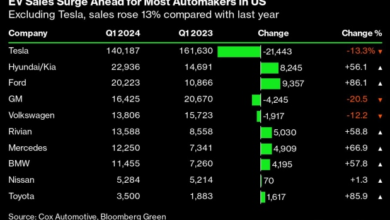Saudi Arabia Electric Vehicle Market Speeding Fast to Reach

New Delhi, May 20, 2024 (GLOBE NEWSWIRE) — Poised for explosive growth, the Saudi Arabia electric vehicle market is projected to reach a staggering US$ 53,639.1 million valuation by 2032. This represents a phenomenal CAGR of 52.31%, up from a value of US$ 1,215.7 million in 2023.
The electric vehicle (EV) market in Saudi Arabia is experiencing a surge in activity, `exceeding expectations and rivaling even developed nations. According to Astute Analytica, Saudi Arabia’s EV market is considered more dynamic than those in advanced economies like Australia and Singapore. This dynamism is fueled by a confluence of factors, including significant government investment, ambitious targets, and a growing consumer interest in sustainable transportation.
Download Free Sample Copy: https://www.astuteanalytica.com/request-sample/saudi-arabia-electric-vehicle-market
The Saudi government is placing a major bet on electric vehicles. A staggering $50 billion is expected to be invested in EV production over the next decade in the electric vehicle market. This commitment is further solidified by the Kingdom’s goal of having 30% of all new vehicles sold be electric by 2030. This ambitious target translates into a projected 912,010 EV units sold in Saudi Arabia by 2032, representing a significant portion of the total vehicle market.
Several factors are converging to create a strong demand for EVs in Saudi Arabia. The country’s growing population and economic activity are driving up electricity consumption, making EVs a more sustainable alternative. Furthermore, EVs are seen as a crucial component in achieving the environmental and economic goals outlined in Saudi Vision 2030, the Kingdom’s strategic development roadmap. The flourishing small and medium-sized enterprises (SMEs) are also contributing to the demand, requiring a growing number of commercial electric vehicles. Beyond national initiatives, regional trends are also playing a role. The growing focus on EVs by governments across the Middle East and North Africa (MENA) region, along with increased awareness about energy storage solutions, is expected to fuel market growth. Expanding 5G networks and the implementation of Vision Documents are further expected to boost EV adoption in Saudi Arabia. The flourishing e-commerce and transportation & logistics sectors are also anticipated to stimulate demand for zero-emission commercial vehicles.
Building a Robust Charging Infrastructure, Aiming to Build 50,000 Chargers by 2025
Recognizing the importance of readily available charging stations, the Saudi government is taking decisive action. The Saudi Electric Vehicle Charging Infrastructure Development Initiative (SEVCIDI), launched in 2021, has set a target of installing a staggering 50,000 charging stations across the nation by 2025. This ambitious target is further complemented by initiatives to promote electric vehicle market growth. Since 2018, Saudi Arabia’s General Sports Authority has hosted the Diriyah ePrix, a Formula E world championship race featuring electric vehicles, showcasing the technology and its potential.
Partnerships and Investments Fuel Infrastructure Expansion In Saudi Arabia Electric Vehicle Market
The Saudi government isn’t going it alone to support the growth in the country. Partnerships with international companies are accelerating infrastructure development. A prime example is the collaboration between Lucid Motors and Saudi Arabia to establish the country’s first electric vehicle manufacturing plant. The National Industrial Development Center (NIDC) is also actively involved, aiming to develop a robust domestic EV manufacturing industry to meet the growing demand. Additionally, companies like Siemens and Schneider Electric are partnering with local entities to expand the charging network with cutting-edge ultra-fast chargers. These collaborations, along with massive investments from both public and private sectors, are expected to fuel the rapid expansion of EV production and charging infrastructure in the coming years.
Regional Focus and Challenges
The Northern and Central region, which includes Riyadh, is expected to be the leader in Saudi Arabia electric vehicle market due to the ambitious target of having 30% of all vehicles in the capital be electric by 2030. Saudi Arabia’s dominance in the region is further solidified by the fact that it accounted for almost 52% of all vehicles sold in the Gulf Cooperation Council (GCC) and 35% in the entire MENA region in 2020. The MENA region itself boasts an impressive growth rate of 36% for the EV market, with Saudi Arabia leading the charge.
Despite the promising outlook, challenges remain. The Kingdom’s deep economic and cultural dependence on oil presents a hurdle, as the transition to EVs disrupts the existing energy structure. Furthermore, the current lack of a widespread charging network makes EV ownership less convenient for many potential buyers. Addressing this challenge will require significant financial investment to expand the charging network across
Key Findings in Saudi Arabia Electric Vehicle Market
| Market Forecast (2032) | US$ 53,639.1 million |
| CAGR | 52% |
| Largest Region (2023) | North America (35%) |
| By Type | Hybrid Electric Vehicle (71.56%) |
| By Vehicle Type | Passenger Car (45.98%) |
| By Charger | Normal 84.33% |
| By Power Output | Less than 100 KW (58.72%) |
| By Sales Channel | OEMs (97.65%) |
| Top Trends |
|
| Top Drivers |
|
| Top Challenges |
|
Passenger Cars Lead the Charge in Saudi Arabia’s Electric Vehicle Market By Capturing More than 45% Market Share
Passenger cars, including sedans, hatchbacks, and SUVs, are the undisputed champions of Saudi Arabia’s electric vehicle (EV) market, capturing over 45% of the revenue share. This dominance stems from a confluence of consumer preferences, market trends, and government initiatives. Passenger cars have long been the most popular vehicle segment in Saudi Arabia, and this preference is translating seamlessly into the burgeoning EV market. While luxury gasoline-powered cars remain popular, a growing number of consumers are looking towards electric alternatives. This is further fueled by the projected growth of the passenger car segment, expected to surpass 517,000 units by 2027, presenting a significant opportunity for EV adoption.
Interestingly, consumer sentiment plays a crucial role in shaping the Saudi electric vehicle market. A survey conducted in Hail City revealed that user opinions significantly influence the transition from traditional cars to EVs. This highlights the growing public interest and potential for widespread passenger EV adoption. The Saudi government is actively capitalizing on this trend. With ambitious plans to go electric, they are positioning the Kingdom as a major EV supplier in the region. Collaborations with global players are underway to establish EV manufacturing bases. Additionally, the government is investing heavily through the Public Investment Fund and partnering with established companies to leverage expertise in EV production.
Government initiatives extend beyond manufacturing. A memorandum of understanding (MoU) with the UK aims to reduce carbon emissions and support Saudi Vision 2030. This collaboration includes knowledge sharing in developing key technologies like smart grids and EVs. Furthermore, the Saudi Standards, Metrology and Quality Organization (SASO) plays a critical role by setting EV deployment requirements, ensuring compliance, and granting necessary certificates.
Inquire more about this report before purchasing: https://www.astuteanalytica.com/inquire-before-purchase/saudi-arabia-electric-vehicle-market
Fast-Charging Ahead: Saudi Arabia Speeds Up EV Adoption with Widespread Infrastructure
Saudi Arabia is accelerating its electric vehicle (EV) revolution with a massive undertaking to establish a nationwide fast-charging network. The newly formed Electric Vehicle Infrastructure Co. (EVIC), a joint venture between the Public Investment Fund (PIF) and Saudi Electricity Company (SEC), is spearheading this initiative in the electric vehicle market. Their ambitious target is to have a presence in over 1,000 locations and install a staggering 5,000 fast chargers by 2030. This aggressive investment reflects the Kingdom’s commitment to fostering a robust EV ecosystem. Beyond infrastructure development, Saudi Arabia is actively promoting private sector participation and collaborating with key players across the industry. This strategy is evident in the establishment of Lucid Group’s first international manufacturing plant in King Abdullah Economic City (KAEC), partially funded by PIF itself. Furthermore, the Ministry of Industry and Mineral Resources has granted Ceer, the country’s first homegrown EV brand, an industrial license to produce electric vehicles.
Strategic partnerships are another pillar of Saudi Arabia’s EV strategy. Energy Capital Group’s collaboration with US tech startup Pure Lithium exemplifies this approach, focusing on the development of renewable energy sources for powering EVs. The government is also actively securing access to critical resources like lithium through mining licenses, while simultaneously attracting global EV manufacturers to set up production bases within the country.
These initiatives in the electric vehicle market are driven by a clear vision outlined in Saudi Vision 2030: economic diversification, environmental sustainability, and technological advancement. The large-scale EV infrastructure deployment aligns perfectly with these goals. The widespread adoption of EVs is expected to stimulate non-oil economic growth, create new job opportunities, and benefit consumers through cost savings. Additionally, Saudi Arabia has established a robust regulatory framework for EV charging, focusing on installation requirements, safety standards, and environmental protection. National modifications have been incorporated into internationally recognized standards for conductive EV charging, overseen by the Saudi Standards, Metrology and Quality Organization (SASO).
By prioritizing EV infrastructure and fostering a collaborative environment, Saudi Arabia is not only positioning itself as a leader in the regional EV market but also laying the groundwork for a sustainable and prosperous future.
Saudi Arabia’s EV Market Charges Forward: A Battle for Dominance Where Top 4 Players Capture Over 58%
The electric vehicle market in Saudi Arabia is a battleground for top contenders. Toyota Motor Corporation reigns supreme with over 20% market share, backed by strategic partnerships and investments in charging infrastructure. This aligns perfectly with Saudi Vision 2030’s push for green mobility. Hyundai Motor Company trails closely at over 15%, fueled by substantial R&D in EV technology and a planned assembly plant – the first for a Korean automaker in the Middle East – dedicated to electric vehicles. Barq EV plays a crucial role by promoting electric public transportation systems, while BMW AG maintains a strong presence with its global commitment to environmental sustainability. As per Astute Analytica, Toyota maintains its lead, selling over 47,000 vehicles of all type in the first half of 2023.
Hyundai’s upcoming assembly plant and CKD system for assembling electric car parts solidify their market focus. Hyundai and its affiliates are already establishing a network in the country. Hyundai KEFICO Corp recently signed a 250 billion won ($189 million) deal with Ceer Motors for EMS and power conversion systems. The landscape is further electrified by new entrants.
This fierce competition in the electric vehicle market is fueled by Saudi Arabia’s ambitious goals. Their target of having a third of Riyadh’s cars be electric by 2030 creates openings for established players to grab a larger slice of the market pie. PIF’s significant investments in Lucid Motors and its $500 million joint venture with Hyundai for a vehicle manufacturing plant showcase a strong governmental push towards a robust domestic EV industry. The benefits of these strategic moves extend beyond established players. The Hyundai joint venture is expected to create jobs, transfer knowledge, and propel advancements in local vehicle production. Additionally, PIF’s efforts to localize automotive component manufacturing strengthen the supply chain, further bolstering Hyundai’s market position.
This strategic electric vehicle market capture aligns with the global shift towards sustainable transportation solutions. PIF’s multi-pronged approach, through investments in Hyundai, Lucid Motors, and Ceer Motors, positions Saudi Arabia as a key player in the evolving automotive value chain. The localization efforts are expected to attract further investments, solidifying the presence of major players like Hyundai and ultimately supporting Saudi Arabia’s ambitions as a regional EV leader.
Saudi Arabia Electric Vehicle Market Key Players
- BMW AG
- BYD Company Ltd.
- Ceer Motors
- Lucid Group, Inc.
- MG Motor
- The Hyundai Motor Company
- Toyota Motor Corporation
- Volkswagen AG
- Other Prominent Players
Market Segmentation:
By Type
- Battery electric vehicle (BEV)
- Fuel cell electric vehicle (FCEV)
- Plug-in hybrid electric vehicle (PHEV)
- Hybrid electric vehicle (HEV)
- Autonomous Electric Vehicles
By Vehicle Type
- Passenger Cars
- SUVs
- Light Commercial Vehicles
By Charger
By Power Output
- Less than 100 KW
- 100-250 KW
- Above 250 KW
By Sales Channel
View report summary and Table of Contents (TOC): https://www.astuteanalytica.com/industry-report/saudi-arabia-electric-vehicle-market
Browse Related Reports:
UAE Electric Vehicle Market: By Type (Battery electric vehicle (BEV), Fuel cell electric vehicle (FCEV), Plug-in hybrid electric vehicle (PHEV), Hybrid electric vehicle (HEV), Autonomous Electric Vehicles); Vehicle Type (Passenger Cars (Small, Medium, and Large), SUVs (Small, Medium, Large), Light Commercial Vehicles (Pick-Up Trucks and Vans), Others); Charger (Fast and Normal); Power Output (Less than 100 KW, 100-250 KW, Above 250 KW); Sales Channel (Aftermarket and OEM)— Market Size, Industry Dynamics, Opportunity Analysis and Forecast for 2024–2032
Kuwait Electric Vehicle Market: By Type (Battery electric vehicle (BEV), Fuel cell electric vehicle (FCEV), Plug-in hybrid electric vehicle (PHEV), Hybrid electric vehicle (HEV), Autonomous Electric Vehicles); Vehicle Type (Passenger Cars (Small, Medium, and Large), SUVs (Small, Medium, Large), Light Commercial Vehicles (Pick-Up Trucks and Vans), Others); Charger (Fast and Normal); Power Output (Less than 100 KW, 100-250 KW, Above 250 KW); Sales Channel (Aftermarket and OEM)— Market Size, Industry Dynamics, Opportunity Analysis and Forecast for 2024–2032
Israel Electric Vehicle Market: By Type (Battery electric vehicle (BEV), Fuel cell electric vehicle (FCEV), Plug-in hybrid electric vehicle (PHEV), Hybrid electric vehicle (HEV), Autonomous Electric Vehicles); Vehicle Type (Passenger Cars (Small, Medium, and Large), SUVs (Small, Medium, Large), Light Commercial Vehicles (Pick-Up Trucks and Vans), Others); Charger (Fast and Normal); Power Output (Less than 100 KW, 100-250 KW, Above 250 KW); Sales Channel (Aftermarket and OEM)— Market Size, Industry Dynamics, Opportunity Analysis and Forecast for 2024–2032
About Astute Analytica
Astute Analytica is a global analytics and advisory company which has built a solid reputation in a short period, thanks to the tangible outcomes we have delivered to our clients. We pride ourselves in generating unparalleled, in depth and uncannily accurate estimates and projections for our very demanding clients spread across different verticals. We have a long list of satisfied and repeat clients from a wide spectrum including technology, healthcare, chemicals, semiconductors, FMCG, and many more. These happy customers come to us from all across the Globe. They are able to make well calibrated decisions and leverage highly lucrative opportunities while surmounting the fierce challenges all because we analyze for them the complex business environment, segment wise existing and emerging possibilities, technology formations, growth estimates, and even the strategic choices available. In short, a complete package. All this is possible because we have a highly qualified, competent, and experienced team of professionals comprising of business analysts, economists, consultants, and technology experts. In our list of priorities, you-our patron-come at the top. You can be sure of best cost-effective, value-added package from us, should you decide to engage with us.
Contact Us:
Astute Analytica
Phone: +1-888 429 6757 (US Toll Free); +91-0120- 4483891 (Rest of the World)
For Sales Enquiries: sales@astuteanalytica.com
Website: https://www.astuteanalytica.com/
LinkedIn | Twitter | YouTube



